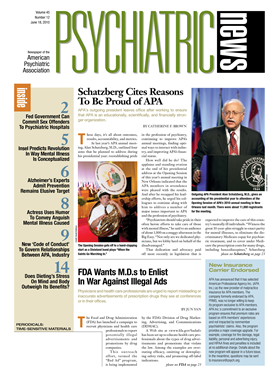Carol Bernstein, M.D., has a pretty good idea of what tomorrow's psychiatrist—and tomorrow's APA—will look like.
The new APA president, who took office at the close of the APA annual meeting last month in New Orleans, has spent much of her career educating psychiatry residents. In an annual meeting address, she told psychiatrists that the “Gen-Xers”—those born from 1964 to 1982—and the “millenials” (those born after 1982), would be changing the face of psychiatry.
And APA will have to change too.
“The generation Xers and the millennials are our field's future leaders, educators, researchers, and clinicians,” Bernstein said. “The communication and technological changes they have witnessed and are part of will radically alter the way in which they live their lives. They are the most racially and ethnically diverse in our nation's history.... [T]hey are digital natives and have been using computers since pre-kindergarten. They are accustomed to giving feedback and getting feedback, to instant communication, and to speed. They are optimistic and oriented toward collective action.”
Most important, Bernstein said, they have a dramatically different idea of what their working lives should be like.
“Generation X is moving into its peak family-raising years, and previous census data show an increase in stay-at-home Gen-X moms,” she noted. “They are all looking for a less ‘frazzled’ lifestyle. Most of them have no intention of having one job throughout their lives. Their view of authority is based on competence, not on how many years someone has worked. And most of all, they believe that we have gotten it all wrong about work-life balance.”
Bernstein said she would make it a goal of her presidency to help APA “build communities and build bridges” across the generations. “We must redefine important concepts such as work-life balance—and view this not as either/or—but as a dynamic interplay that redefines who we are and what we do.”
And she noted that in pursuit of this goal, she has been hosting “town-hall meetings” with residents around the country. “These gatherings have been enormously helpful to me in beginning to understand some of the vital issues that are of concern to our young colleagues,” she said. “We must look to them to help us figure out how to redefine and reconfigure our Association so that it can be the most effective and efficient as possible in confronting the issues that we and our patients face.”
In other ways, too, the field is poised for change. “American psychiatry is at a pivotal point as we enter the second decade of the 21st century,” Bernstein emphasized. “With the passage of a health care reform bill and parity legislation, we are positioned to help assure that our patients are fully integrated into the house of medicine. The culture of discrimination against the mentally ill is starting to change,” she said, but added that while such bias is receding, hard work and vigilance will be needed to make sure that this trend continues.
“The law is not perfect,” she stated. “Many fear that since parity is only required if mental health and substance abuse services are offered in an insurance plan, insurance companies will no longer offer those categories of coverage. There is also concern that if reporting requirements are too onerous, psychiatrists and mental health professionals will not participate in these plans. Still others are concerned about the lawsuits that have been filed by managed care companies opposing implementation of parity.
“Nevertheless, I cannot begin to describe the unprecedented consequence of the parity law, coming as it does with the initiation of real health care reform for the first time in this country's history. Because of the parity law, insurance programs must manage mental illness and substance abuse disorders the same way that other medical disorders are managed.”
She predicted that with the growing momentum behind concepts such as the “medical home” and “accountable care organizations,” medical specialties would be increasingly integrated into primary care. And she said psychiatry could lead the way.
“For decades, we have utilized the team model in the treatment of our patients,” Bernstein said. “We have understood the significance of ‘disability, not just diagnosis,’ the need to address social issues such as housing, vocational rehabilitation, and an approach called ‘recovery,’ which focuses on helping individuals with chronic illnesses to be valued members of our society. We are the glue for all of medicine. Without an appreciation of human behavior and the many factors that contribute to how people approach both health and illness, efforts to try to combat obesity, hypertension, diabetes, smoking, cancer—to say nothing of depression, anxiety, psychosis, and suicide—will all go for naught.”


